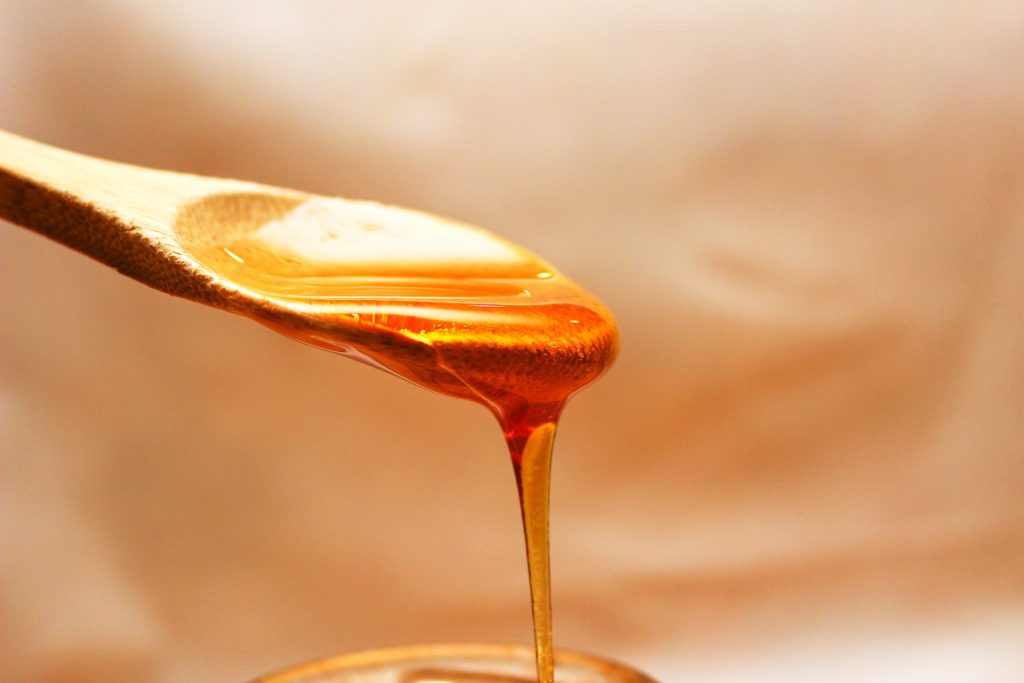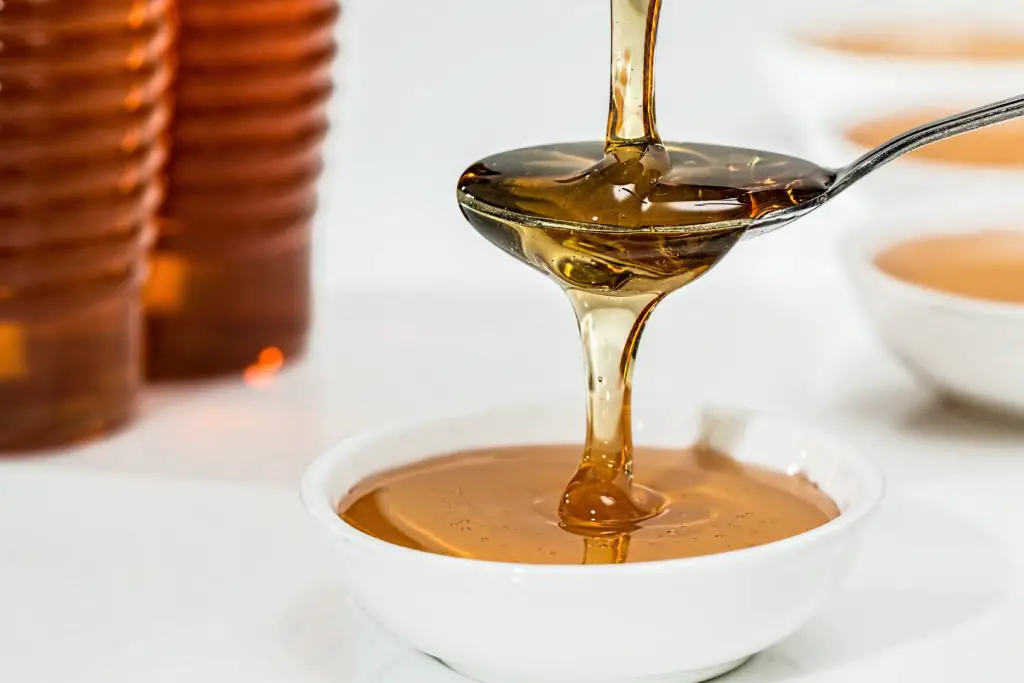Honey is defined as a super food due to its numerous health benefits to both humans and animals. For centuries honey has been used both medicinally and as a natural sweetener. Can dogs eat honey? Most dogs can benefit from having small amounts of honey.
Honey comes with a long list of health benefits; however, it could be off limits to certain types of dogs. Most dogs will see the greatest benefits from eating local unpasteurized honey.
What exactly is honey? In a brief summary, bees collect flower nectar that they store inside a honeycomb. The bees are constantly fanning the nectar which causes it to be broken down into simple sugars, creating what we call honey. The color, flavor and medicinal benefits all vary due to the source of nectar collected.
In this article, Can Dogs Eat Honey, you will learn about the outstanding nutrients contained in raw honey, how to feed honey to your dog, and what dogs are best not eating honey.
- Nutritional Value of Honey for Canines
- Best Way to Serve Honey
- How Much Can My Dog Eat?
- Potential Concerns for Serving Honey to Dogs
- Types of Honey
Nutrition facts about raw honey; it is 17% water, fat-free, and the calories in honey come from carbohydrates (natural sugars). One tablespoon of honey contains 64 calories and 17 grams of sugar.
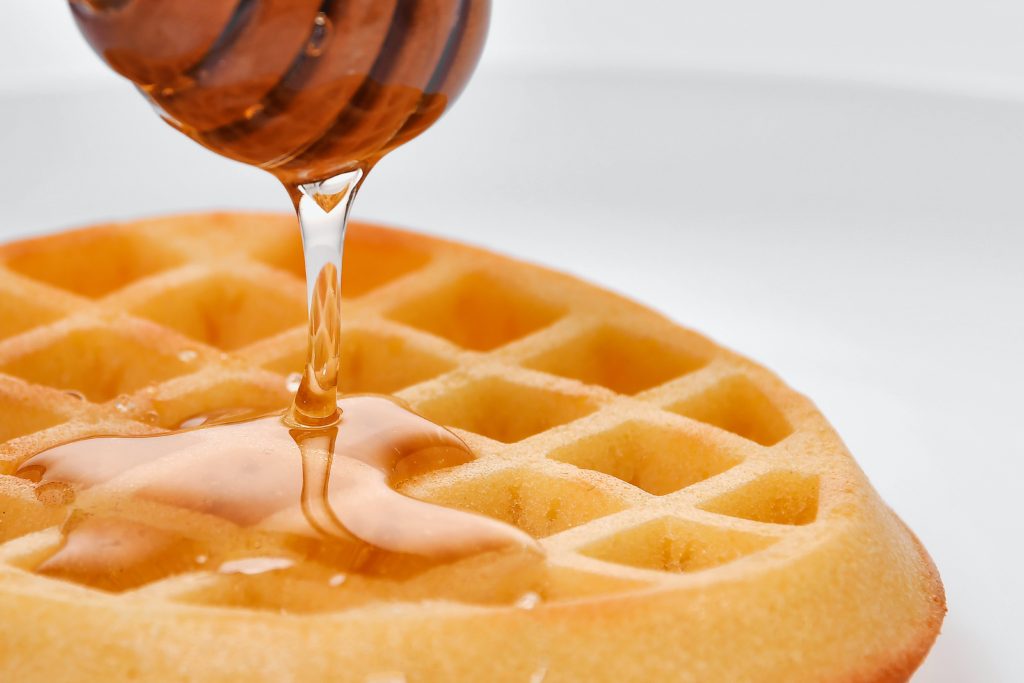
Related Articles:
- A Review of the 5 Best Slow Feed Dog Bowls
- A Review of the 5 Best Retractable Dog Leashes
- A Review of the 5 Best High Fiber Dog Foods For Anal Gland Problems
- The 5 Pawsitively Best Dog Nail Grinders
- How to Get a Dog To Take a Pill
- Learn The Secrets Of How to Clip a Dog’s Nails Safely!
Can dogs eat honey? Nutritional Value of Honey for Canines
Honey can be purchased as raw or pasteurized, it is important to know the difference.
Pasteurized Honey. Pasteurized honey is filtered and heated to create a clear easy to pour product. Pasteurization removes any impurities and extends the appearance while on the shelf. Unfortunately, many of the healthy nutrients and microorganisms are destroyed in the pasteurization process. Commercial honey manufacturers are not required to list added sugars, such as high fructose corn syrup, on the bottle.
Raw Honey. Raw honey comes directly from the hive and may even contain bites of beeswax. It has not been filtered, processed, heated, or pasteurized. Over time unheated honey will begin to thicken and become crystalized.
Dogs can still eat raw honey that crystalizes. It can be gently warmed to make it smoother. Place the jar in a container of warm tap water. Microwaving or exposing raw honey to high temperatures destroys the healthy enzymes and beneficial properties.
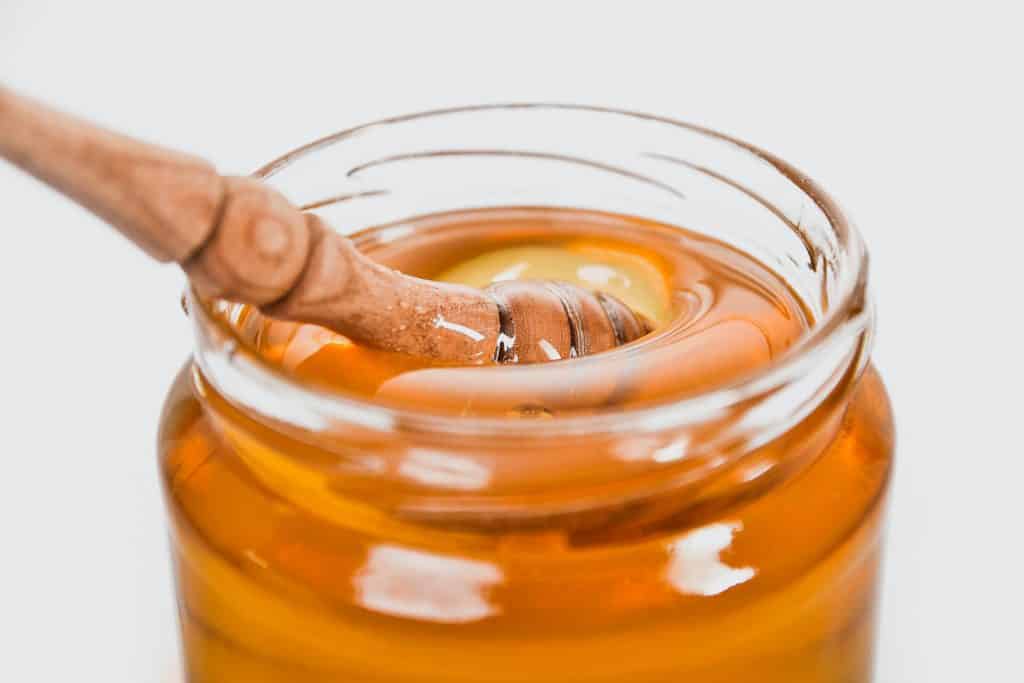
Related Articles:
- A Review of the Top 5 Best Brooms For Dog Hair
- A Review of the 5 Best Peanut Butters for Dogs
- A Review of the 4 Best Dog Shampoos for Itchy Skin
- A Review of the 5 Best Dog Brushes For Short Hair
- A Review of the 6 Best Dog Harnesses for Hiking
Can dogs eat honey? Health Benefits Contained in Raw Honey
- Vitamin A: necessary for healthy coat, skin, and vision. It is also necessary for building muscles.
- B Vitamins: support energy levels and brain function
- Vitamin C: lowers inflammation in the body, builds immunity, antioxidant properties
- Vitamin D: supports the immune system
- Vitamin E: essential for cell function and fat metabolism
- Quercetin: rich in antihistamines, reducing allergy symptoms
- Minerals such as zinc, iron, potassium, calcium, magnesium, manganese, and copper.
- Antioxidants: combat free radicals reducing cell damage, boosts immunity, and reduces inflammation.
More health benefits from feeding your dog honey:
Beneficial Enzymes: The enzymes found in raw honey aid in reducing inflammation and soothing gastrointestinal issues (such as diarrhea and bloating.) Raw honey benefits include antifungal, antibacterial, and antimicrobial, which is one reason honey has a very long shelf life.
Anti-inflammatory: Raw honey soothes dogs that experience pain and swelling from arthritis and hot spots. Manuka honey is especially beneficial for reducing inflammation.
Lowers Environmental Allergies: Many dogs experience inflammation and autoimmune responses in the form of environmental allergies. Local raw honey can help build the antibodies up in the dog to reduce allergy symptoms.
Soothes a Cough. Honey is known to soothe mucus membranes, especially for dogs that are suffering from a frequent cough. Dog owners often use it to reduce the irritation caused by the sickness called, Kennel Cough.
Dog owners often know the health benefits of honey for humans, is it always safe to ask, can dogs eat honey? Dogs can benefit from the ancient nutrition found in raw honey. Just a little bit of honey provides beneficial vitamins, minerals, antioxidants, and a boost of energy for your dog.
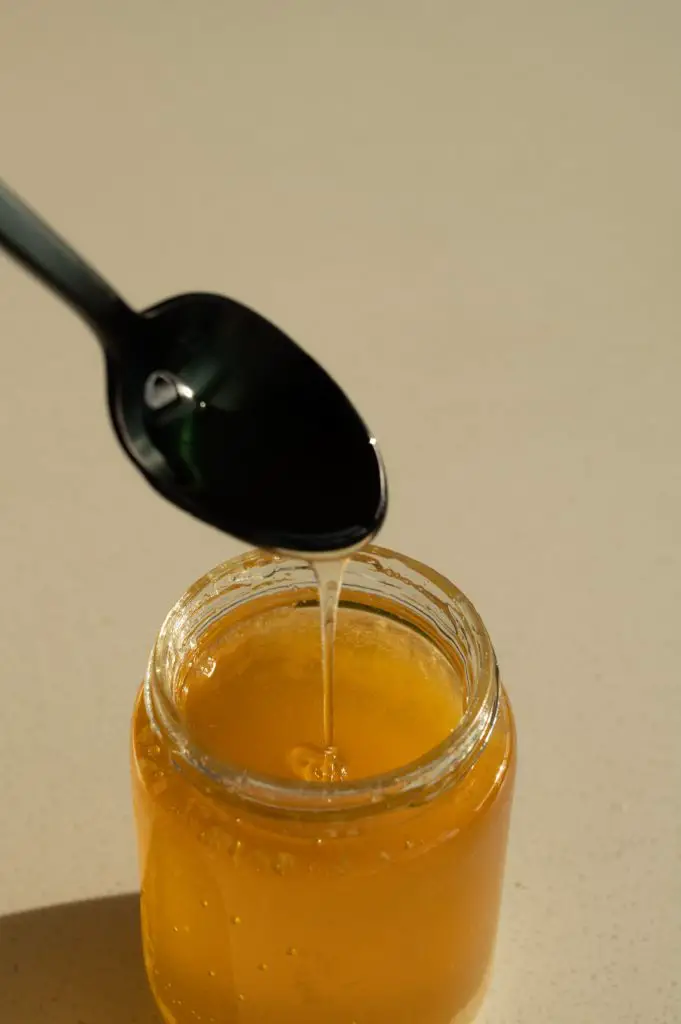
Related Articles:
Can dogs eat honey? Best Way to Serve Honey
Can dogs eat honey? Certainly, many dogs can benefit from consuming raw honey. Here are suggestions for adding this little superfood to your dog’s diet.
- Let them lick it off a spoon
- Put honey on a dog treat
- Add to a food stuffable toy
- Mix with pumpkin or peanut butter
- Add the honey directly to their food
Be sure to add the appropriate amount for your size dog. Most dogs love the sweet mild flavor of honey. The key is to not overdo it with this medicinal food.
Can dogs eat honey? How Much Can My Dog Eat?
You want your dog to benefit from the vitamins, antioxidants, and soothing power of honey, however, it is best to always serve in the appropriate amounts. Only a little bit of honey is needed for your dog to benefit.
- Small dogs: ½ tsp – 1 teaspoon
- Medium dogs: 1 – 2 teaspoons
- Large & Giant dogs: Up to 1 tablespoon
One tablespoon (which is three teaspoons), is equal to 17 grams of sugar and 64 calories. When you are uncertain of how much to feed your dog, consult with your local veterinarian.
Related Articles:
- How to Cook Marrow Bones for Dogs
- A Review Of The Top Five Best Foods for Hiding Dog Pills In
- A Review of the Top 5 Best Dog Bones For Aggressive Chewers
- A Review Of The Top 5 Best Bone Broths for Dogs
- A Review Of The Top 5 Best Dog Whistles
Can dogs eat honey? Potential Concerns for Serving Honey to Dogs
Even super foods like honey are not suitable for every dog. Honey can in fact be problematic for dogs with allergies to bees, for puppies, and dogs with diabetes. If your dog falls into these categories, then the answer to, can dogs eat honey, would be a solid no.
High in Sugar. Honey is naturally sweet with its sugar coming from glucose and sucrose. One teaspoon of honey is 6 grams of sugar.
Heated Honey. Honey that has been heated is void of many health benefits. The beneficial bacteria, enzymes, and antioxidants are destroyed.
Processed Honey. Commercial honey looks great on the shelf; however, it has been heat treated and undergone ultra filtration. This honey is lacking any important health benefits. Processed honey often has refined sugars added to reduce the cost to the manufacturer.
Related Articles:
- The Best Canned Dog Food for Dogs with Sensitive Stomachs
- A Review Of The Top 5 Best Tactical Dog Harnesses
- How to Build an Outdoor Dog Potty Area on Concrete
- A Review of the 5 Best Dog Muzzles
- A Review Of The Top 5 Best Dog Clickers
Not suitable for dogs with Diabetes. Due to honey having naturally high sugar content, dogs with diabetes should not consume.
No Honey for Puppies. Young dogs are still developing their immune system, and honey could possibly contain botulism spores. The puppy could become sick and experience gastrointestinal issues.
Allergies to Bees. If your dog is allergic to bees, there is small risk that they could have allergy symptoms after consuming honey.
What happens if my dog eats too much honey? Dogs can experience gastrointestinal issues from too much honey, such as diarrhea or a loss of appetite. Honey is high in sugar meaning it could cause your dog to have elevated blood sugar levels.
Related Articles:
- Ultimate Guide: How To Take Care Of A Puppy
- Ultimate Guide: How To Take Care Of A Dog
- Ultimate Guide: How To Take Care Of A Senior Dog
- The Benefits of Owning a Dog
- Top 12 Tips for First Time Dog Owners
Can dogs eat honey? Types of Honey
When shopping for honey, you will see many different types. Bees can make honey from numerous different sources. You will find wildflower honey, clover honey, Tupelo honey, dandelion honey, Manuka honey and orange blossom honey to name just a fine.
Is one honey better than another? Yes. Dandelion honey and tupelo honey contain some of the highest amounts of antioxidants. The honey with the best medicinal benefits is Manuka honey.
Manuka honey comes from the manuka bush native to New Zealand. It best known for the highest amount of antibacterial properties. The range of benefits for Manuka honey are wound healing, boosting immunity, promoting good oral health, improving digestive issues, and soothing sore throats. Manuka honey is creamy and thick. Dogs can have the same amount as traditional raw honey.
Related Articles:
- How to Cook Liver for Dogs
- How to Get a Picky Dog to Eat
- How to Stop Your Dog from Peeing When Excited
- How to Keep Your House from Smelling like Dog
- How to Measure a Dog for a Harness
Can Dogs Eat Honey?
Most dogs can benefit from a small amount of raw honey or Manuka honey on a daily basis. Honey will reduce inflammation and soothe the digestion of older dogs. The numerous health benefits of honey is why it is considered a medicinal super food.
Please read our Legal Disclaimer

